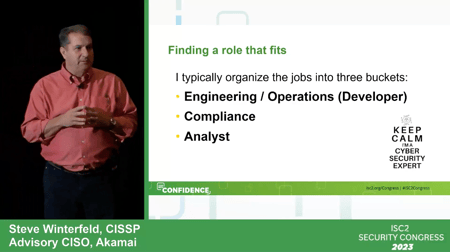Steve Winterfeld, Advisory CISO at Akamai, shared valuable steps to building your cybersecurity career roadmap in a presentation at the ISC2 Security Congress Career Center, produced by ClearedJobs.Net .

Whether you’re interested in moving into cybersecurity or you’re ready to land your first job in the field, your first step should be figuring out where you can fit. Steve Winterfeld notes that it’s not a question of which jobs are the “coolest” in cybersecurity, but rather what’s a good fit for your skillset.
Do you excel at attention to detail? Do you like processes? Do you like to build things or solve puzzles? What do you love? Your skills and interests will help you figure out whether you’re better suited to be a SOC analyst, penetration tester, forensic analyst, or a policy person, among other possibilities.
Steve explained he wouldn’t make a good coder, because he doesn’t have the meticulous attention to detail to find an out of place comma. “That's not something that I would be hugely successful at,” admits Steve. “I wouldn't have joy going to work.”
Therefore, step one to building your career roadmap is making sure you start on the right path. Have a candid conversation with yourself about your abilities, likes and dislikes if you haven’t decided which cybersecurity path to pursue yet.
Develop Skills for Your Next Job
Once you’ve determined what fit would be right for you, and you’ve landed that first job, building a career roadmap relies on keeping your end goal in sight. Even if this is only your first cybersecurity role, Steve advises that it is always a good time to start figuring out how to build your skillset for your next step.
“You need to be an expert in whatever field you're in,” says Steve. “And you need to be an expert in what's coming next in the field you're in.”
But how do you develop skills while working a nine to five? Steve admits it’s a challenge.
The solution: “You need to be a constant learner,” says Steve. “Spend some time figuring out what your learning preference is.”
Different individuals have different learning styles. This may be visual, through reading, or audio, through listening to podcasts or professional development audiobooks. Others may prefer more hands-on learning such as participating in labs or formal coursework. Steve also suggests that having an accountability partner may help motivate you to accomplish your learning goals.
“There are a lot of techniques,” says Steve. “But we don't take the time to research our learning behaviors, and then set up frameworks to drive that learning consistently. That's what I am asking you to think about doing.”
While being an expert in your field requires hard skills, don’t diminish the value of soft skills. “It’s never about the technology,” proposes Steve. “It's always about the people. If you're in the middle of an incident, your communication skills are much more important than the technology.”
“If you can't communicate under stress, you will fail,” adds Steve. “Your soft skills are a toolkit in a crisis.”
Set Your North Star
Have you ever accepted an opportunity that fell into your lap? “Most of us spend our career saying, ‘They just asked me if I want to go into management. I would make more money. I'm going to take advantage of this opportunity,’” explains Steve. “And that's how we manage our entire career – by opportunities.”
“It's not a bad technique,” admits Steve. “And if you're a great person, a great employee, a great partner, you'll have a great career. But you may not have the best career for you. So take a minute and say, what do I want my last job to be? The ultimate job for me.”
Thinking back to that management opportunity, it’s okay to say it’s not a good fit for you if it doesn’t play a part in getting you closer to your ultimate goal.
“By setting a North Star, we're going to do two things,” explains Steve. “We're going to develop the skills we need to get there, and we're going to spend time focused on getting to the next level.”
“The benefit of this exercise is to say, if I want to get there by this age, how do I backward plan?” asks Steve. “What are the steps that helped get me there? And then you start down that path.”
As you work on building your career roadmap, “do the research, go look at the jobs you want, and see what the requirements are,” suggests Steve. “Then go develop the skills based on those requirements.”
The Final Takeaway
“Figure out what your dream job is,” advises Steve. “Figure out what you want to do. Figure out what skills you need to get there. Find a mentor, find out your learning style, build your learning framework, your discipline, and figure out how you're going to force yourself to do the kind of learning you need to become the best person in the room in the skillset you care about.”


.jpg?h=420&iar=0&w=420)